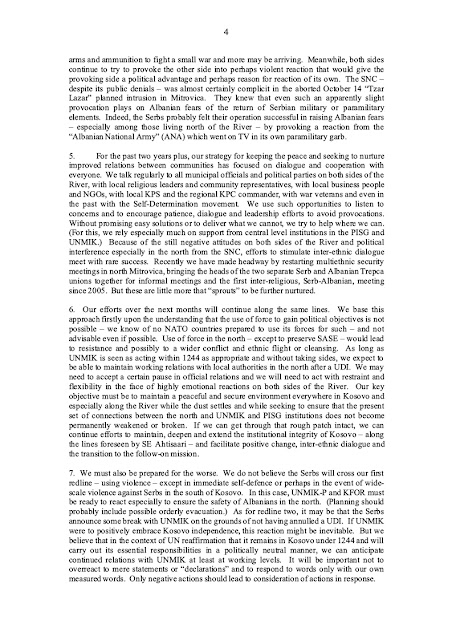Went to Vienna at the end of May, 2007 to take part in a meeting of UNMIK & KFOR (NATO in Kosovo) top command with the person designated to be chief of the International Community Office (ICO) mission formed by the US and EU and meant to replace UNMIK after the UN leaves. (
Note: The UN is still there.). Subject, northern Kosovo. UNMIK North had spent some months trying to educate the EU on the need for a gradual approach and fending off their efforts to get us to do some difficult "chores" -- like dealing with the local Serb's using dinars and Serbian license plates -- before we hand over to them. I met Pieter Fieth, who would be the head man, when he visited Khartoum as EU envoy for Darfur. He said he remembered me well. But I also heard that he did not like Americans. In any case, once he took over, and with the help of NATO, he proved to believe the best way to "tame" the north was to use force. (See:
http://www.transconflict.com/2011/11/kosovo-quint-brinksmanship-241/,
http://www.transconflict.com/2011/09/kosovo-nato-actions-illegal-illogical-and-immoral-309/ and related pieces at
http://www.transconflict.com/author/gerard-gallucci/.
Here follows the text of the agenda for the Vienna meeting with
my annotations for my use as talking points:
Brainstorming on the north of Kosovo
Date: 31 May
Location: Vienna
Participants:
EU
- Pieter Feith, Yves de Kermabon
- Stefan Lehne, Pedro Serrano
- Torbjorn Sohlstrom, Casper Klynge
UN
-
Joachim Ruecker
NATO
-
Pardew, Naples, COMKFOR
US
-
Fletcher Burton
Agenda
1) Preventing hard partition (lead UNMIK+KFOR)
Questions to answer:
-
Are all partners fully prepared for all possible
scenarios? Basic issue: If northerners try to hard partition
(e.g., by crossing UNMIK’s three red lines not simply through
rhetoric), choice is to counter it through diplomacy and political
work or to assume IC military/administrative control of the north.
In the latter case it becomes how many troops and police, readiness
to counter/arrest/shoot those who resist and
appropriate human and financial
resources to administer the north for whatever period of time it
takes to find locals and local resources to do it.
-
What actions might be necessary during the
transition period? How can we ensure full IC support?
-
Belgrade handling?
-
UNMIK actions to prepare for status
implementation, e.g. establishment of new municipality of N.
Mitrovica. Underway but need direct and practical support of EU and
US to focus UNMIK.
2) Integrating the north over time (lead
ICR+ESDP+IMP).
Questions to answer:
-
Which measures are needed to integrate the
north/parallel structures? Patient diplomacy and political work
with local and central officials plus the resources to offer
practical cooperation with IC and between communities and to
replace over time resources supplied by Belgrade.
-
How should these measures be paced and timed?
-
Which positive, reassuring, or face-saving
measures can be used to accompany ‘hard’ measures? How in the
world will you do any “hard” measures without using force? And
what will “face saving” look like after taking away ‘their
country” and using force to make them submit to the Albanians
(which is how they will see it). This strikes me as dangerous
thinking because based more on a conception of how things should go
rather than an understanding of reality.)
-
When and how should the ICR announce the ‘red
lines’ for the north? Should there be a clear signal of strength
at the start? I think you “signal strength” quietly through
presence. Much more useful will be clear signal of understanding
and readiness to work with all communities on practical
cooperation. The essential redline to signal directly and quietly
– within context of assurances of continued cooperation – is
that if local Serb officials refuse to engage with ICO at working
level, IC will have no alternative but to consider assuming direct
control.
-
How does the ICR ensure international support
for his plan and for measures to be taken?
-
Which measures need to be taken vis-à-vis Belgrade, and by whom?
-
How does the ICR deal with a full boycott by the
north? Having made clear the above redline, a little patience
during the “testing” phase of a “boycott” to see how
serious they are or if it is just for form sake and how much and
quickly it will “leak.”
-
Agreed end states after 6 or 12 months?
-
How to use the regional EU perspective?
-
How to involve donors at an early stage? With
money for QIPs on both sides of River and some infrastructure/job
creation activity using private sector.
Intelligence: how do we make sure that ICR and
ESDP HoM have good intel? Best way is people on the ground in each
municipality – including internationals – with locals who will
need to be carefully “milked” by their international colleagues.
PR:
benefits (and limits) of an information campaign?
_________





















